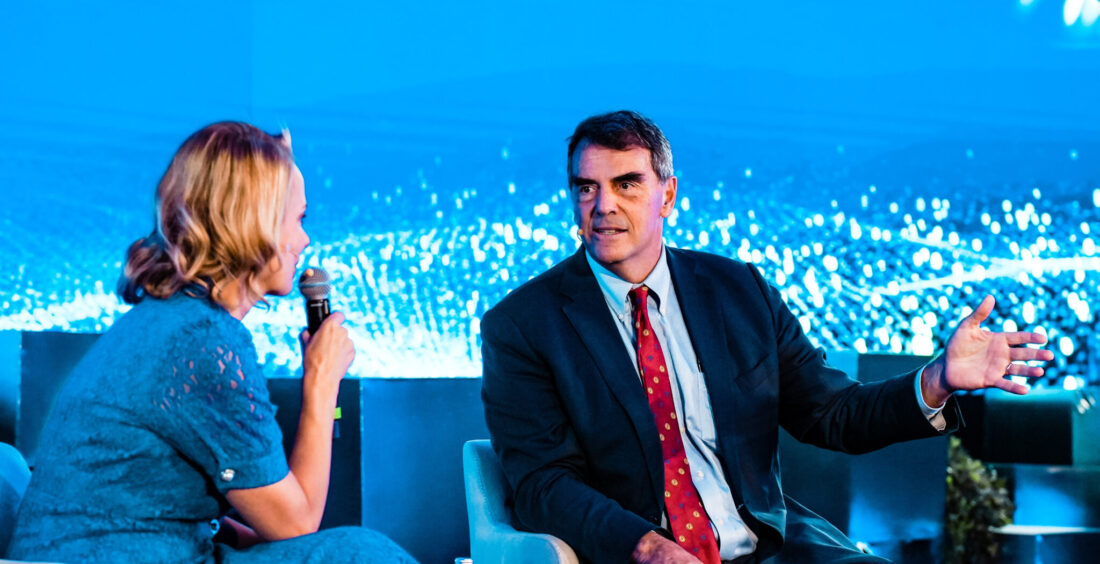American billionaire venture capitalist Tim Draper today expressed his regret at not investing in ChatGPT, believing the Artificial Intelligence-driven chatbot will change industries in a way unseen since the creation of the internet.
Draper, whose most prominent investments include Hotmail, Skype, Tesla, and Twitter, was speaking during a session entitled Global Collaboration: The Fuel For Innovation atLEAP23 – the world’s most visionary tech event –which runs at Riyadh Front Exhibition and Conference Centre until February 9.
In front of a packed audience, the California native said the entrepreneurial pitches that catch his attention when looking to uncover his next unicorn are those that most surprise him and those that lean heavily on new technology.
“Media, communications, entertainment, they all changed because of the internet,” he said.“Bitcoin is transforming huge industries such as insurance, finance, commerce, and government. But I think we have another one now and that is ChatGPT.I’m sorry I didn’t invest in that one.It is extraordinary and it’s really starting to change industry after industry after industry. I can see an entire government bureaucracy running with ChatGPT; an entire law firm running with ChatGPT, I can see media being driven by it.”
Regarding governments, Draper said his travels to some 80 countries worldwide had left him with two clear conclusions when it comes to successful government: “Trust and freedom – you can’t have one without the other. I have been thrilled to see what is happening in Saudi Arabia because these leaders have trusted their people and set them free and attracted other people to their country,” he said.“And I know it’s happened all over this region; a lot of places are starting to really trust their people and set them free, and it makes all the difference. It’s the same as being in North Korea where they don’t trust you to do anything and in South Korea where they trust you to do everything.”
Draper also revealed that his California-based Draper University has seen 120 Saudi Arabian students graduate from its 10-week start-up programme, the last five weeks of which are focused on going out into the world and building a business. “We tweak people’s brains to go out and try things,” he added.“We say: ‘Don’t worry about failing, do whatever you can’. One of the lines of our pledge is:‘I will fail and fail again until I succeed’.”
Draper is one of more than 700 speakers presenting at LEAP23, with the talent roster ranging from billionaire entrepreneurs and business magnates to sporting heroes and musical icons. Shortly after the 64-year-old stepped off stage, 17-year-old Gitanjali Rao took his place –two globally renowned innovators representing two very different demographics yet sharing a similar message of not fearing failure, embracing mistakes, and persevering until success is achieved.
Rao, an American student, author, and STEM promoter, has already created an array of patented innovations, from a program that can diagnose snake bites to a device that can detect lead in drinking water; a digital AI service that reduces cyberbullying to an electrically charged pollen screen that prevents airborne allergies.
“A teacher told me once that fail stands for ‘first attempt in learning’ and I stick with that on a daily basis,” said Rao, who was named Time magazine’s top young innovator in 2020 and named on Forbes’ 30 Under 30 list for her innovations. “Be a risk-taker – never stop taking risks. Failure is just another step to success.”
A three-time TedX speaker, Rao outlined to LEAP23 attendees her“five-step innovation process that normalises failure”: Observe, brainstorm, research, build, and communicate. Having shared the process with children as part of an innovation movement in the USA, Kenya, Afghanistan, India, Nepal, and the UAE, among others, Rao presented it in front of a packed-out conference hall filled with men and women of all ages and nationalities.
“Observe:identify a problem in your community that you are passionate about,” she said.“Secondly, brainstorm:Come up with a list of solutions and focus on quantity over quality –it’s always important to come up with as many solutions as possible. Third: Research, which is when you narrow down that list of solutions to one or two. Next,build them and bring them to life. And finally – the most important and underrated step –communicate. Post about ideas, leverage the power of social media. Get feedback and ask questions to improve.”
With more than 100,000 tech innovators and disruptors in Riyadh this week, LEAP23 is expected to help fast-track Saudi’s economic and societal transformation. The enduring legacy of this year’s event, which is powered by the Ministry of Communications and Information Technology (MCIT) in conjunction with Tahaluf – a strategic joint venture co-owned by Informa PLC and SAFCSP – is expected to be a huge catalogue of breakthrough products, ideas, and partnerships.
Michael Champion, Regional EVP of MEA at LEAP23 organisers Informa Markets, said the involvement and insights from such inspirational figures as Draper and Rao can only support the technological development of Saudi Arabia, which announced nine funds worth a combined US$2.4 billion on Tuesday, all intended to support the growth of start-ups in the Kingdom as it embarks on creating a more competitive tech ecosystem.
“The speaker line-up at LEAP23 is unlike anything this region has seen before. It will help drive the development of Saudi, the wider region, and the entire global tech industry,” said Champion. “This is only the second day of the event’s second year, yet we are already seeing that LEAP is fast becoming unmissable on the international calendar of entrepreneurs, startups, and venture capitalists worldwide.”
For more information, please visit https://www.onegiantleap.com






Comments are closed.